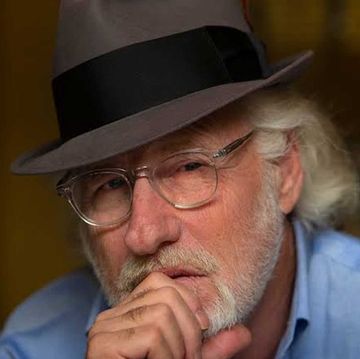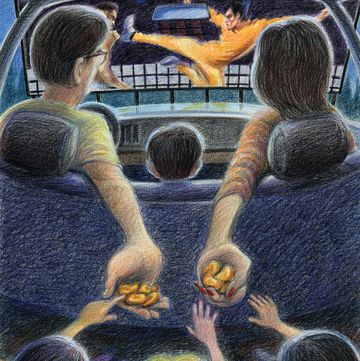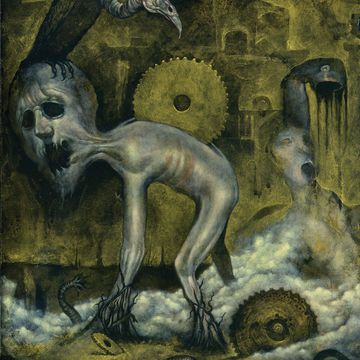One hundred years ago, silent movie star and heartthrob Rudolph Valentino published a truly weird little book of poems called Day Dreams. He released the collection while he was on a nearly two-year-long “one-man strike” against his studio, demanding higher production standards for his pictures and better pay.
The so-called Latin Lover, the leading man of such epics as 1921’s The Four Horsemen of the Apocalypse and The Sheik, was deep in a witchy-goth phase of séances and occultism, explored in the company of his daring and manipulative second wife, the costume designer Natacha Rambova (born Winifred Shaughnessy, from Salt Lake City).
To be frank, his single volume is not, strictly speaking, good. Preeminent silent film scholar Jeanine Basinger derides its contents as “rotten poems…in which he claimed that the real author was a power working through him to help him pen such immortal lines as ‘Your kiss, a flame of Passion’s fire.’ ”
Overall, Valentino’s written oeuvre reads like proto–Instagram poetry—brief, abstract, comprising short lines, and light on imagery but big on emotion. Take “A Baby’s Skin”:
Texture of a butterfly’s wing,
Colored like a dawned rose,
Whose perfume is the breath of God.
Such is the web wherein is held
The treasure of the treasure chest
The priceless gift—the Child of Love.
Such titles as “Gratitude” are not out of keeping with the zeitgeist—bullet journaling, happiness-as-a-choice—on Insta and TikTok. “Faithfulness,” dedicated to “Our Little Friend—The Dog,” possesses a timeless,
platitudinous appeal to pet lovers: “A dog is the nearest approach to the sweet submissive spirit God would have in us, Faithfulness in the highest form.”
This article appears in Issue 27 of Alta Journal.
SUBSCRIBE
In fairness, Valentino claimed to have no illusions regarding his skill as a poet, writing in the introduction, “To you, my gentle reader, I wish to say a foreword of warning before you peruse the contents of this book. I am not a poet, nor a scholar, therefore you shall find neither poems nor prose. Just dreams—Day Dreams—a bit of romance, a bit of sentimentalism, a bit of philosophy, not studied, but acquired by constant observation of that greatest of masters!…Nature!”
His offering of dreams echoed the offerings of the studios for which he and his fellow actors worked, places known colloquially as dream factories. On paper as on celluloid, Valentino dives with abandon into the depths of ardor and the admiration of beauty. In “Stradivarius,” dedicated to violinist Jascha Heifetz, he writes:
If power were only given me,
To paint the tone picture that arises from the soul
Of that sanctuary of sound—your violin,
Where would I find pigment worthy of such a use,
Save in the fleeting splendour of some sky.
As he does in many of his performances, Valentino brings an over-the-top, elbow-to-the-ribs do-you-get-it sensibility to his lyric outpourings. After “Cremation,” about the ritual of burning “a packet of letters tied with a bit of blue,” he leaves this note: “To rake over the dead ashes of a burnt out love one must use the pen point of poetry.”
Valentino’s poetic outpourings occurred at a time when Hollywood was drawing inspiration from verse: D.W. Griffith writing and directing a movie called Edgar Allen [sic] Poe in 1909; Colleen Moore playing the title role in 1918’s Little Orphant Annie, based on the popular 1885 poem by James Whitcomb Riley; and cowboy actor William S. Hart starring in the 1915 film Pinto Ben, adapted from a poem he wrote in which a cowboy recites a campfire elegy about his dead horse: “So long—you Son of a Gun.” Leading lady Barbara La Marr, who, like Valentino, died young, wrote poetry too, adding to her reputation for extreme sensitivity and emotional tumult. Called in the press “the Girl Who Is Too Beautiful,” she circulated publicity photos of herself at her typewriter.
These days, poetry is less ambient in Hollywood. Netflix and Apple TV+ aren’t bidding on Ada Limón, and we appear to be in no danger of an Amazon Prime series based on the work of Frederick Seidel. Yet in some ways, Valentino’s forays into poetry—or dreams, as he insisted—are not so removed from the business exigencies of the 21st-century dream factories where writers were recently on strike for better compensation and conditions. As Valentino explains in the introduction to Day Dreams, “while lying idle, not through choice, but because forcibly kept from my preferred and actual field of activity, I took to dreams to forget the tediousness of worldly strife and the boredom of jurisprudence’s pedantic etiquette.”
When Valentino died at 31 of peritonitis following a surgery on a perforated ulcer, poetry poured from the public, too. A tribute in the October 1926 issue of Photoplay lamented, “His feet had carried him so very swiftly, / Into the lands of wonder and romance; / And yet, although they traveled far, / They never forgot how to dance.” More than 100,000 people jammed the streets of New York City for his funeral, and reportedly, numerous women, driven mad by sorrow, attempted suicide by taking poison or slitting their wrists.
One of the purposes of poetry is to preserve a memory. Valentino’s strange prose poem “The School of Life” concludes, “Eternity is the Empire.” While it remains unclear whether these poems were transmissions from the beyond when he wrote them, they certainly are now.•
Kathleen Rooney’s latest novel, From Dust to Stardust, is inspired by the life of the silent movie star Colleen Moore. Rooney is a founding editor of Rose Metal Press and a founding member of Poems While You Wait, and her most recent poetry collection is Where Are the Snows.












